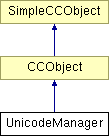
#include <unicdman.h>
Inheritance diagram for UnicodeManager:

Static Public Member Functions | |
| static UINT32 | ComposeMultiBytes (BYTE LeadChar, BYTE TrailChar) |
| static void | DecomposeMultiBytes (UINT32 MBChar, BYTE *LeadChar, BYTE *TrailChar) |
| Platform independent way of testing for lead bytes. Note: It's inline, in the header One standard (correct!) way for composing the lead and trail bytes Note: It's inline, in the header One standard (correct!) way for decomposing the lead and trail bytes. | |
| static BOOL | IsDBCSLeadByte (BYTE TestChar) |
| static UINT32 | UnicodeToMultiByte (WCHAR UnicodeChar) |
| Converts a single unicode character into it's multi-byte equivelent. BUT what about two composed characters? Oh... | |
| static WCHAR | MultiByteToUnicode (UINT32 MBChar) |
| Converts a single multi-byte character into it's unicode equivelent. BUT what about two composed characters? Oh... Unimplemented as no one will cope with two chars being returned... | |
| static BOOL | IsUnicodeCompleteOS () |
| static BOOL | IsDBCSOS () |
| static UINT32 | GetFontCharSet () |
| Reads what value the system is using for the character sets of its fonts. | |
Definition at line 116 of file unicdman.h.
|
||||||||||||
|
Definition at line 121 of file unicdman.h.
|
|
||||||||||||||||
|
Platform independent way of testing for lead bytes. Note: It's inline, in the header One standard (correct!) way for composing the lead and trail bytes Note: It's inline, in the header One standard (correct!) way for decomposing the lead and trail bytes.
Definition at line 146 of file unicdman.cpp. 00147 { 00148 ERROR3IF(LeadChar==NULL || TrailChar==NULL, "Output pointers were NULL"); 00149 00150 if (LeadChar!=NULL || TrailChar!=NULL) 00151 { 00152 *LeadChar = (MBChar >> 8) & 0xFF; 00153 *TrailChar = MBChar & 0xFF; 00154 } 00155 }
|
|
|
Reads what value the system is using for the character sets of its fonts.
Definition at line 337 of file unicdman.cpp. 00338 { 00339 if( IsDBCSOS() ) 00340 return SHIFTJIS_CHARSET; 00341 else 00342 return ANSI_CHARSET; 00343 00344 // UINT32 CharSet = 0; 00345 // 00346 // // This appears to be the only way of doing this. It's ugly as we have to create a DC. 00347 // if (!IsWindows31()) 00348 // { 00349 // CWnd* pWnd = CWnd::GetDesktopWindow(); 00350 // if (pWnd!=NULL && pWnd->GetDC()!=NULL) 00351 // CharSet = ::GetTextCharset(pWnd->GetDC()->GetSafeHdc()); 00352 // } 00353 // 00354 // return CharSet; 00355 }
|
|
|
Definition at line 127 of file unicdman.h.
|
|
|
Definition at line 316 of file unicdman.cpp. 00317 { 00318 #if defined(__WXMSW__) 00319 return ::GetSystemMetrics(SM_DBCSENABLED); 00320 #elif defined(__WXGTK__) 00321 return true; 00322 #endif 00323 }
|
|
|
Definition at line 298 of file unicdman.cpp. 00299 { 00300 #if defined(__WXMSW__) 00301 return IsWin32NT(); 00302 #elif defined(__WXGTK__) 00303 return true; 00304 #endif 00305 }
|
|
|
Converts a single multi-byte character into it's unicode equivelent. BUT what about two composed characters? Oh... Unimplemented as no one will cope with two chars being returned...
Definition at line 239 of file unicdman.cpp. 00240 { 00241 CHAR MBArray[3]; 00242 WCHAR ReturnArray[4]; 00243 size_t cch; 00244 00245 // Convert UINT32 to DBCS 00246 if( IsDBCSLeadByte( ( MBChar >> 8 ) & 0xFF ) ) 00247 { 00248 MBArray[0] = (MBChar>>8) & 0xFF; 00249 MBArray[1] = MBChar & 0xFF; 00250 MBArray[2] = 0; 00251 cch = 2; 00252 } 00253 else 00254 { 00255 MBArray[0] = MBChar & 0xFF; 00256 MBArray[1] = 0; 00257 cch = 1; 00258 } 00259 00260 #if defined(__WXMSW__) 00261 // Get the active code page. 00262 // This is for Win95/98 systems which do not support unicode. 00263 UINT32 nCodePage = GetACP(); 00264 ERROR3IF( (!IsValidCodePage(nCodePage)), "UnicodeManager::MultiByteToUnicode - not a valid codepage" ); 00265 00266 // Convert to Unicode 00267 if ( ::MultiByteToWideChar(nCodePage, MB_PRECOMPOSED, MBArray, -1, ReturnArray, 4) ) 00268 { 00269 return ReturnArray[0]; // Composed chars then? 00270 } 00271 else 00272 { 00273 ERROR3("MultiByteToWideChar failed"); 00274 /*DWORD dwError = GetLastError(); 00275 //ERROR3_PF ("Error=%lx", dwError); 00276 char sError[20]; 00277 sprintf (sError, "Error=%lx", dwError); 00278 ERROR3 (sError);*/ 00279 return 128; 00280 } 00281 #else 00282 mbstate_t state; 00283 memset(&state, 0, sizeof(mbstate_t)); 00284 mbrtowc( ReturnArray, MBArray, cch, &state ); 00285 return ReturnArray[0]; 00286 #endif 00287 }
|
|
|
Converts a single unicode character into it's multi-byte equivelent. BUT what about two composed characters? Oh...
Definition at line 172 of file unicdman.cpp. 00173 { 00174 #if defined(__WXMSW__) 00175 if (UnicodeChar < 128) 00176 return UnicodeChar; 00177 00178 CHAR Return[20]; 00179 LPSTR lpReturn = Return; 00180 INT32 sizeReturn = sizeof lpReturn; 00181 00182 // Get the active code page. 00183 // This is for Win95/98 systems which do not support unicode. 00184 UINT32 nCodePage = GetACP(); 00185 ERROR3IF( (!IsValidCodePage(nCodePage)), "UnicodeManager::UnicodeToMultiByte - not a valid codepage" ); 00186 00187 // COnvert from Unicode 00188 if ( ::WideCharToMultiByte(nCodePage, WC_COMPOSITECHECK | WC_DEFAULTCHAR, &UnicodeChar, 1, 00189 lpReturn, sizeReturn, NULL, NULL) ) 00190 { 00191 if (IsDBCSLeadByte(Return[0])) 00192 return ((unsigned char)Return[0] << 8) | (unsigned char)Return[1]; 00193 else 00194 return (unsigned char)Return[0]; 00195 } 00196 else 00197 { 00198 ERROR3("MultiByteToWideChar failed"); 00199 return 128; 00200 } 00201 #else 00202 char psz[MB_CUR_MAX]; 00203 switch( wctomb( psz, UnicodeChar ) ) 00204 { 00205 case 1: 00206 return (unsigned char)psz[0]; 00207 00208 case 2: 00209 return ( (unsigned char)psz[0] << 8 ) | (unsigned char)psz[1]; 00210 00211 case 4: 00212 printf( "UniCh = %08x\n", ( (unsigned char)psz[0] << 24 ) | 00213 ( (unsigned char)psz[1] << 16 ) | ( (unsigned char)psz[2] << 8 ) | 00214 (unsigned char)psz[3] ); 00215 return( (unsigned char)psz[0] << 24 ) | ( (unsigned char)psz[1] << 16 ) | 00216 ( (unsigned char)psz[2] << 8 ) | (unsigned char)psz[3]; 00217 00218 default: 00219 ERROR3("MultiByteToWideChar failed"); 00220 return 128; 00221 } 00222 #endif 00223 }
|
 1.4.4
1.4.4